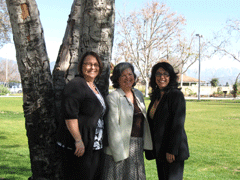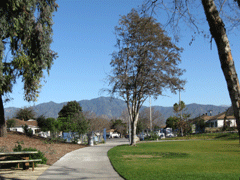Labor Leader’s Green Leanings
Air Date: Week of January 16, 2009

(Courtesy of Hilda L. Solis)
Hilda Solis, Barack Obama’s pick for Labor Secretary, has been a pioneer in getting barrio kids into college to train for green jobs. Living on Earth’s Ingrid Lobet looks at some of the forces that shaped California Congresswoman Hilda Solis.
Transcript
CURWOOD: From the Jennifer and Ted Stanley Studios in Somerville, Massachusetts - this is Living on Earth. I’m Steve Curwood.
What do former Senator Elizabeth Dole and former Secretary of State George Shultz have in common?
They were both Secretary of Labor, they also had Ivy League educations, and neither grew up in union households. They are in direct contrast to Barack Obama’s pick for Secretary of Labor, California Congresswoman Hilda Solis. Not only does she come from a union family, that family had to deal with hazardous working conditions, now Hilda Solis will oversee the Occupational Safety and Health Agency, including mine safety, and enforce the nation’s labor laws. She’ll also put into action the Obama plan to train workers for the new, green economy. Living on Earth’s Ingrid Lobet has our report.

Congresswoman Hilda Solis has represented the San Gabriel Valley at the state and federal level (Photo: Ingrid Lobet)
LOBET: Hilda Solis's mother was born in Nicaragua. Her father was born in Mexico. And she was born, the third of seven kids, in the blue-collar Los Angeles suburb of La Puente.
MOLINA: To see someone like Hilda from the neighborhood, from our community now to be a top cabinet member.
LOBET: That's Gloria Molina, the first woman, and the first Latina elected to the powerful Los Angeles County Board of supervisors, 18 years ago.
MOLINA: For me it's very dramatic. I'm not so sure I was going to get to see it in my lifetime.

Veronica Dolleschel (City of El Monte), Belinda Faustinos (San Gabriel Mountain Conservancy) and Norma Edith Garcia (L.A. County) have worked with Rep. Solis on public green space and green jobs projects like this one, Rio Vista Park. (Photo: Ingrid Lobet)
LOBET: Molina and Solis both represent the San Gabriel Valley. It's an area of contrasts: small neat houses, beautiful mountains, at least on a clear day, and says Belinda Faustinos of the San Gabriel Mountains Conservancy:
FAUSTINOS: The most landfills and the most gravel pits that there are in the nation in one concentrated area.
LOBET: The neighborhoods are also home to manufacturing, and the good jobs that come with it. In her own home growing up, Hilda Solis had a daily, first-hand view of the tradeoffs some employees made when they worked in the trades.
SOLIS: I look at my own father's previous career, who worked at a battery recycling plant - not a great job, paid well, but nobody wanted the job, so he did it for 20 years, and now he is suffering from all kinds of health ailments because of contaminants, toxins and no safety equipment at the time.
LOBET: It's remarkable that someone with this proximity to heavy work will now oversee the nation's workplace safety programs. Solis' parents weren't just blue collar, they were union members and her dad was a shop steward. But Gloria Molina says businesses shouldn't fear that Solis will over-regulate, because she also understands more than most the importance of employment like her father's.
MOLINA: You can regulate all day long and in many instances you regulate those businesses right out of the neighborhood, right out of the community. And those jobs are important. Hilda's family would not have survived had he not had a job of that type.
[CHILDREN RUNNING IN SCHOOLYARD, MUSICAL INSTRUMENTS, BIRDS]
LOBET: In a playground in El Monte, preschoolers run in circles, clasping bells and maracas. Their yard looks out on a new public park, landscaped in native plants, the tale of a historic berry strike etched in the concrete. Belinda Faustinos says more than a decade ago, Hilda Solis saw the need for relief from the concrete and created the Conservancy that's funding this and other green places in the region.

(Courtesy of Hilda L. Solis)
FAUSTINOS: I mean she definitely was one of the first people I encountered in the legislature that I worked with who had this personal commitment to open space.
LOBET: After creating the San Gabriel Mountains Conservancy to channel funding, Faustinos says Solis helped set it up so local people would be trained, at the college level, to actually build the parks.
FAUSTINOS: And they recruited children, local youth to train them basically to doing native landscaping for instance to make sure they understood how to put in filtrations system to allow for groundwater recharge. So they partnered with Rio Hondo College and some of the professors there to provide for training modules for the students.
LOBET: So Solis has been advocating for green jobs since before the term was common.
SOLIS: Thank you and Buenos Dias.
LOBET: Last Fall she addressed the Center for American Progress.
SOLIS: To me we are on the cusp of really changing the way we think about manufacturing, the way we think about job creation and the way we think treating the environment. In many ways I believe this is the new industrial green revolution.
LOBET: In Congress Solis introduced legislation to ease the cost of future climate change legislation on low-income people. She pushed for retraining for environmental jobs, for changes in how chemicals are regulated, and for limits on diesel soot from international shipping because of the impact on portside communities.
SOLIS: I have seen actually these air filters and I couldn't believe it. I thought, “How could that happen?” In the course of 24 hours you see a white sheet and 24 hours later, it is entirely black. That is affecting our respiratory tracts, cancer and all the other things that bring down the health and wellbeing of the communities that live around those areas, around the ports.

The San Gabriel Mountains, visible on clear days, frame a public park that youth conservation corps members helped build, on land Rep. Hilda Solis helped protect. (Photo: Ingrid Lobet)
LOBET: But when it came time for Congresswoman Solis to appear before the Senate Labor Committee as part of her confirmation, Senators didn't have these issues on their minds. Democrats wanted to know whether Solis would commit to supporting paid family leave, addressing the shortage of nurses and high unemployment among people who are disabled.
Republicans wanted her to promise to maintain a private voting process in workplace union elections, rather than just letting employees sign cards saying they want to join. They were not satisfied with Solis's answers to that question, nor to whether she agrees that employees in a union workplace should be able to opt out of that union. Here's Senator Lamar Alexander of Tennessee.
ALEXANDER: Will you oppose any attempt to change the right of states to enact a Right To Work law as 22 states already have?
SOLIS: That is something that--I believe that I am qualified to address that at this time, that is not something that I have personally discussed with the president elect.
LOBET: And Republican Senator Mike Enzi of Wyoming asked Solis whether non-union contractors would still be able to compete on government contracts.
SOLIS: I think that is something I am not able to speak to you at this time but will like to review and come back to you personally on this matter.
ENZI: Okay... so far we have three reviews.
LOBET: Despite the concern over her labor background, it's expected that Hilda Solis, the Congresswoman from California's 32nd district, will soon be United States Secretary of Labor.
For Living on Earth, I'm Ingrid Lobet in Los Angeles.
Living on Earth wants to hear from you!
Living on Earth
62 Calef Highway, Suite 212
Lee, NH 03861
Telephone: 617-287-4121
E-mail: comments@loe.org
Newsletter [Click here]
Donate to Living on Earth!
Living on Earth is an independent media program and relies entirely on contributions from listeners and institutions supporting public service. Please donate now to preserve an independent environmental voice.
NewsletterLiving on Earth offers a weekly delivery of the show's rundown to your mailbox. Sign up for our newsletter today!
 Sailors For The Sea: Be the change you want to sea.
Sailors For The Sea: Be the change you want to sea.
 The Grantham Foundation for the Protection of the Environment: Committed to protecting and improving the health of the global environment.
The Grantham Foundation for the Protection of the Environment: Committed to protecting and improving the health of the global environment.
 Contribute to Living on Earth and receive, as our gift to you, an archival print of one of Mark Seth Lender's extraordinary wildlife photographs. Follow the link to see Mark's current collection of photographs.
Contribute to Living on Earth and receive, as our gift to you, an archival print of one of Mark Seth Lender's extraordinary wildlife photographs. Follow the link to see Mark's current collection of photographs.
 Buy a signed copy of Mark Seth Lender's book Smeagull the Seagull & support Living on Earth
Buy a signed copy of Mark Seth Lender's book Smeagull the Seagull & support Living on Earth

